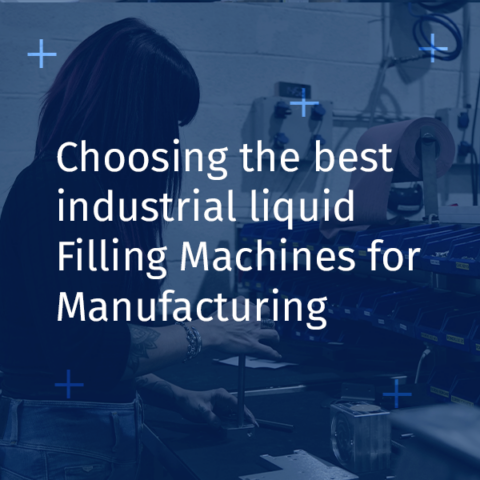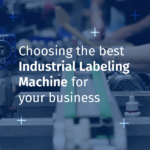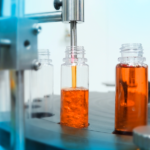In the manufacturing industry, the precision of liquid filling machines is critical for ensuring product quality, reducing losses, and maximizing efficiency. Whether in food, pharmaceutical, or cosmetic industries, accurate filling is essential for compliance, minimizing production costs, and boosting customer satisfaction.
In this article, we explore how the accuracy of liquid fillers affects business performance and what types of technologies ensure optimal results.
Why is precision important in Liquid Filling Machines?
Liquid filling machines play a important role in the production process. They determine the exact amount of product in each container, ensuring that every unit meets company standards for quality and quantity. Insufficient precision can lead to overfilling, increasing production costs, or underfilling, potentially leading to customer complaints and costly product recalls.
In the U.S., the liquid filling machine market is expected to reach $8.29 billion by 2025, growing at an annual rate of 4.2%. This highlights the importance of these machines for companies aiming to improve their productivity and product quality.
Impact of Filling accuracy on product quality
Filling accuracy is not just a cost issue; it directly impacts perceived quality and regulatory compliance. For example, overfilling could result in product spillage during opening, affecting customer perception. Conversely, underfilling may be seen as deceptive, damaging brand reputation.
Key Stat: According to a study by Packaging Digest, 55% of consumers judge product quality based on packaging presentation and filling uniformity, demonstrating the importance of precision.
Cost efficiency and waste reduction: how accurate machines minimize losses
An inaccurate filling can lead to expensive product waste, particularly in industries with high raw material costs (e.g., luxury cosmetics or pharmaceuticals). Volumetric and pump fillers are designed to measure each drop accurately, allowing companies to maintain high production levels while minimizing waste.
Example: A cosmetics company using a volumetric automatic filler reduced product waste by 10%, saving over $50,000 annually.
Technologies that ensure filling accuracy
There are several types of filling machines, each using specific technologies to ensure accurate dosing. Below is an overview of the most common technologies:
- Volumetric Fillers (K-Net auto)
These machines measure the exact liquid volume using pistons or cylinders for each product unit. They are ideal for products with stable viscosity, like oils and syrups.
Advantage: High precision for products with consistent density. - Pump Fillers (Volumetric Piston Cart)
Using pumps to dose the product, these machines are particularly suited for high-viscosity liquids like creams, gels, or lotions.
Advantage: Flexibility for various liquid viscosities and adjustable dosing precision. - Gravity Fillers
Using gravity to control liquid flow, these machines are simple and cost-effective but are better suited for low-viscosity products like water or light juices.
Limitations: Less precise than pump or volumetric systems but ideal for large-scale production with higher tolerance margins.
Industries that rely heavily on accurate filling machines
- Pharmaceuticals
In this sector, extreme precision is required to ensure the correct dosage of medications. Even a minor error can be costly and pose health risks. Volumetric and piston fillers are commonly used for their high accuracy levels. - Food & Beverage
Food companies must ensure that each product meets the quantity standards indicated on the packaging. An inaccurate fill can result in regulatory penalties.
Example: A sauce manufacturer increased its batch compliance rate from 92% to 99.5% by adopting new volumetric filling technology. - Cosmetics
In the cosmetics industry, filling accuracy is crucial to avoid costly waste and ensure that every bottle reflects the quality expected by customers. Pump fillers are often preferred for handling products with varying viscosities.
Choosing the right Filling Machine to meet precision requirements
Selecting the right filling machine depends on several factors, including:
- Product Type: Viscosity, density, and liquid behavior.
- Production Volume: A small production line may only need a semi-automatic machine, while a large-scale operation would require a fully automated solution.
- Compliance Needs: Certain industries, such as pharmaceuticals, require certified machines to ensure traceability and safety.
Tip: For businesses with diverse needs, consider modular machines like those offered by CDA USA, which provide enhanced flexibility and precision while adapting to multiple product formats.
Conclusion: How accurate Filling Machines support business growth
Investing in a precise liquid filling machine is crucial for ensuring quality, reducing costs, and maintaining compliance. Whether you operate in food, cosmetics, or pharmaceuticals, optimal filling accuracy not only enhances customer satisfaction but also yields long-term financial benefits.
At CDA USA, we offer a wide range of filling machines tailored to meet the specific needs of every industry. Contact our team to learn how our solutions can transform your production line and boost your profitability.







